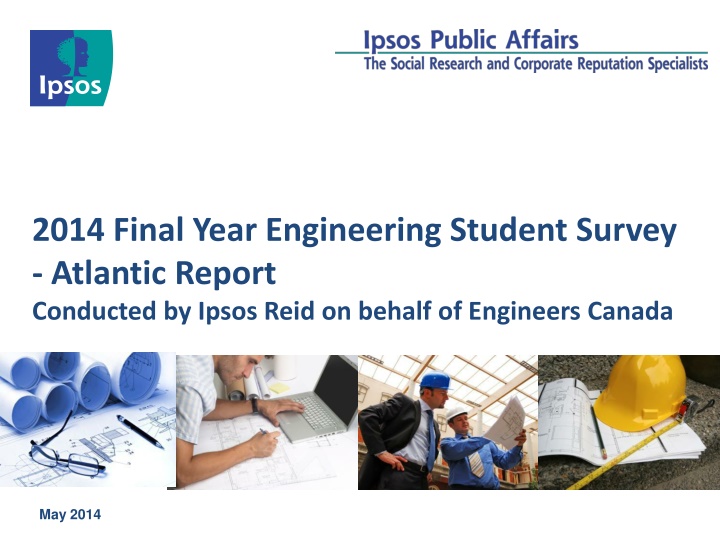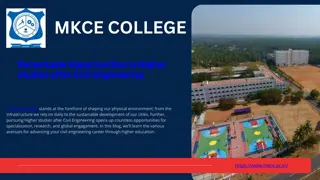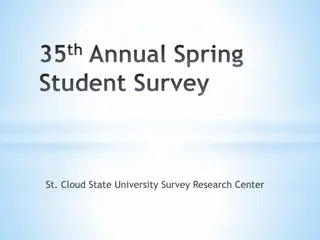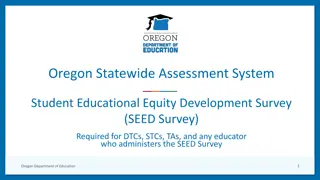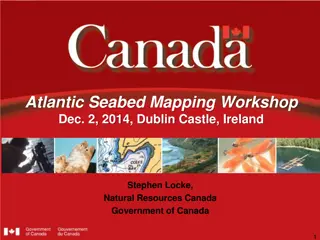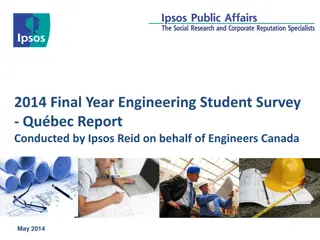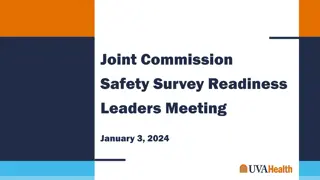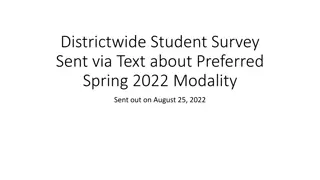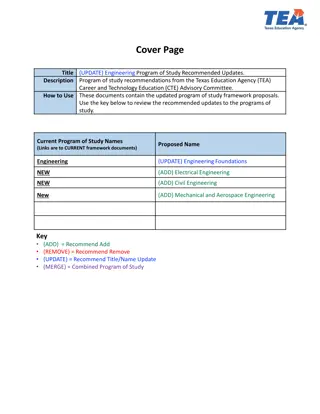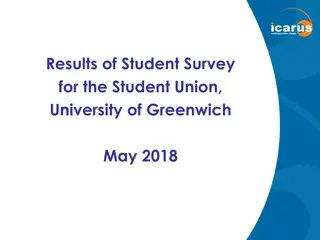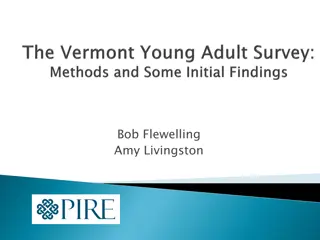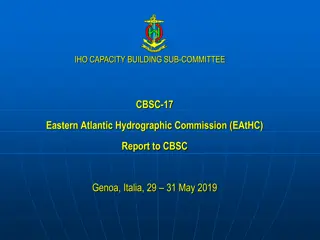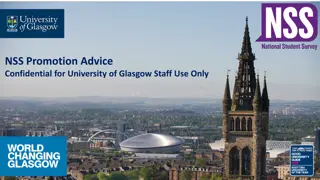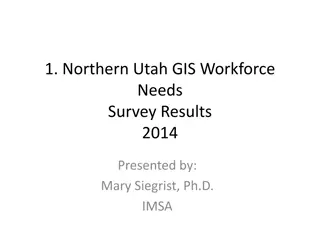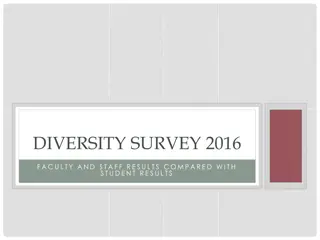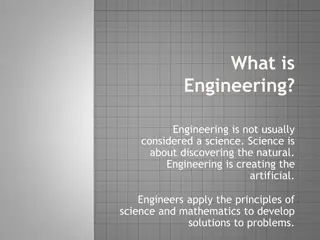2014 Final Year Engineering Student Survey - Atlantic Report
This report presents the results of a survey conducted by Ipsos Reid on behalf of Engineers Canada in May 2014, focusing on final year engineering students in Atlantic universities. The research objectives included understanding students' career plans, intention to apply for licensure, and knowledge of professional engineering regulations. The methodology involved an online survey from January to March 2014, with participation from 39 universities and 2,046 students. The report highlights key findings, demographics, and insights relevant to future career paths in engineering.
Download Presentation

Please find below an Image/Link to download the presentation.
The content on the website is provided AS IS for your information and personal use only. It may not be sold, licensed, or shared on other websites without obtaining consent from the author.If you encounter any issues during the download, it is possible that the publisher has removed the file from their server.
You are allowed to download the files provided on this website for personal or commercial use, subject to the condition that they are used lawfully. All files are the property of their respective owners.
The content on the website is provided AS IS for your information and personal use only. It may not be sold, licensed, or shared on other websites without obtaining consent from the author.
E N D
Presentation Transcript
2014 Final Year Engineering Student Survey - Atlantic Report Conducted by Ipsos Reid on behalf of Engineers Canada May 2014
ATLANTIC Table of Contents Research Objectives 3 Methodology 4 Key Highlights 6 Executive Summary 7 Future Plans 11 Intention to Apply for Licensure 17 Licensing Knowledge 28 Knowledge of Association of Professional Engineers 34 Knowledge of Professional Engineers Act 37 Appetite for Career Assessment Tool 40 Demographics 45 Additional Analysis: Impact on Intention to Pursue Attendance at Workshop/Seminar 49 Knowledge of PEA 52 Knowledge of Licensing and Roles 55 Knowledge of Organizational Responsibility 58 2
ATLANTIC Research Objectives The primary objective of this research is to understand the reasons why graduates of CEAB accredited engineering programs at Atlantic universities do or do not intend to apply for their licence. In order to achieve this objective, the research seeks to understand the following: The future career and/or education plans of final year engineering students; The percentage of final year engineering students who intend to pursue a career in Engineering and the percentage who intend to apply for their P.Eng licence; Final year engineering students level of knowledge of the Professional Engineers Act of their province. 3
ATLANTIC Methodology The online survey was conducted between January 27 to March 14, 2014 with final year engineering students. All university Faculties of Engineering with CEAB accredited programs were invited to participate in the study and were asked to send the online survey to all final year engineering students registered in their Engineering program. The link to the online survey was sent to the universities and each school was requested to send the survey link to all qualified students on January 27, 2014. The survey was offered in both English and French. A total of 39 universities participated in the research and 2,046 students completed the survey. Within Atlantic provinces specifically, 4 schools participated and a total of n=154 students completed the survey. The margin of error for this study (n=154) is 8.0%, 19 times out of 20. 4
ATLANTIC Methodology (cont d) For certain questions, the base size was too low to include in reporting. These include: Q16, Q17 and Q18 (only n=3 responded to these questions) Q23 (only n=3 responded to this question) Please note: base sizes under n=30 are considered very small and should be interpreted with caution 5
ATLANTIC Key Highlights Compared to last year, we have observed little statistically significant movement in terms of students intentions to pursue a career in engineering or to apply for licensure. There has however been a slight softening of definite intentions to pursue a career in engineering, however overall intentions remain strong. We have also noticed the opposite in terms of intentions to apply for licensure with a directional increase in definite intentions. These measures will be important to watch moving forward to see if the incremental movement observed this year develops into a trend. While virtually all students continue to report they are likely (definitely/ probably) to pursue a career in engineering (98% vs. 98% in 2013), directionally fewer students definitely will than in the past (76% down from 83% last year). Overall, two thirds (66%) of final year engineering students are at least probably likely to apply for licensure, unchanged over the past year (68% in 2013), however the proportion who are definitely likely has increased slightly versus 2013 (45% vs. 40%). There has also been some declines in terms of students knowledge regarding the engineering profession year over year. Compared to 2013, we notice an increase in those students who have a low level of knowledge regarding licensing and roles within the profession (8% vs. 2% in 2013), however the vast majority continue to have a high or moderate level of knowledge (90% vs. 94%). Specifically, there has been a directional decline in the proportion of students who know that a licence is required to perform engineering work independently (87% vs. 92% in 2013). 6
ATLANTIC Executive Summary Future Intentions: Continuing Education Versus Entering Workforce More than eight in ten (85%) final year engineering students say they intend to go into the workforce after graduating with their bachelors degree in Engineering, while one in ten (9%) students intend to pursue more education. Of those who intend on pursuing more education, the vast majority (n=12) plan to pursue a graduate degree in engineering. Due to very small base sizes, results should be interpreted with caution. Among those students who plan to pursue more education, New Brunswick is mentioned most often as their preferred location for further studies, followed by Nova Scotia and Ontario. Future Intentions: Engineering Career Virtually all students (98%) say they are likely to pursue a career in engineering, three quarters definitely will (76%) while slightly more than two in ten probably will (22%). Very few students (2%) probably will not pursue a career in engineering, while none indicate they definitely will not. Over nine in ten (94%) students say that when they began their studies they planned to practice engineering upon completion of their program. Two thirds of students began their undergraduate studies with a definite intention to pursue an engineering career (64%), while three in ten said it was likely (31%). 7
ATLANTIC Executive Summary (continued) Future Intentions: Engineering Career (continued) Consistent with the overall level, over nine in ten students who intend to pursue a career in engineering say they were definitely (65%) or likely (31%) to pursue a career in the engineering field when they began their studies. Fewer than one in ten (4%) say they originally intended to pursue an alternate career. Future Intentions: Pursue Licensure More than four in ten of all students (45%) indicate that they definitely intend to apply for licensure, while nearly two in ten (21%) say they probably will. One quarter of students are unlikely to apply, of which nearly two in ten probably won t (16%), while fewer than one in ten definitely won t apply (7%). One in ten don t know (11%). Of those students who specifically plan to pursue an engineering career, 46% indicate they definitely will and 21% probably will pursue their licence, nearly identical to overall levels. Of those who do not intend to immediately pursue their licence, nine in ten indicate that they probably or definitely will apply for licensure sometime down the road (91%), while one in ten do not foresee themselves applying in the future (9%). Due to very small base sizes, results should be interpreted with caution. Once told that a licence is required to legally refer to yourself as an engineer and practice as an engineer, the vast majority (n=13) of those who originally did not plan to pursue their licence now indicate they are definitely or probably likely to do so. Due to very small base sizes, results should be interpreted with caution. 8
ATLANTIC Executive Summary (continued) Future Intentions: Pursue Licensure (continued) Of those who intend to pursue their licence, seven in ten students plan to do so within one year (69%), of which half will do so within six months (52%). Slightly more than one in ten intend to apply after a year (15%) or remain undecided (16%). Among those students who plan to wait at least a year to apply for licensure or are unsure, virtually all (n=44) cite the desire for required work experience as the reason for the delay or uncertainty. Upon learning that the fee for the first year of the Engineering-in-Training [EIT] program can be waived if they apply within six months of graduation, over nine in ten (95%) say they are at least likely to apply within a 6 month timeframe. Knowledge of Engineering Profession At eight in ten (83%), the vast majority of students know that engineering is regulated by legislation, while one in ten believe it is not and 7% are unsure. Students knowledge of the Professional Engineers Act of their respective province is varied, four in ten students report having a fair amount (38%) or just a little knowledge (43%) about the Professional Engineers Act, while 4% claim to know a lot about it. Only 4% say they have never heard of the Act. Nine in ten students know that a licence is required to perform engineering work independently (87%) while seven in ten know it is needed to use the title Engineer (71%). Further, eight in ten know that it is not required to practice engineering work under the supervision of a P.Eng (80%). 9
ATLANTIC Executive Summary (continued) Knowledge of Engineering Profession (continued) The vast majority of students are able to correctly identify that their respective provincial engineering association is the organization responsible for licensing engineers (84%) and that it also regulates the practice of professional engineers (69%). Comparatively, nearly nine in ten students know that CEAB is the organization that accredits University engineering programs (87%). Students are split however on which organization licences companies offering engineering services, half feel it is their respective provincial engineering association (48%), while one third believe it is CEAB (34%) and one quarter don t know (25%). Appetite for Career Assessment Tool At nine in ten (90%), the vast majority of students think it would have been very (48%) or somewhat helpful (42%) to have had a tool in high school that would help determine if they would have been a good fit for engineering studies. An identical proportion of students (90%) feel that a career assessment would be helpful, of which half indicate it would be very helpful (49%) and four in ten somewhat helpful (41%). Most students feel that a career assessment tool would be most helpful in their 3rdyear of school (41%), followed by around one quarter who mention either their 2nd year (25%) or 4th year (26%), while only one in ten mention 1st year (8%). Only 1% of students report being aware of Engineers Canada s Career Focus program. 10
Future Plans 11
ATLANTIC Plans After Graduation Consistent with last year, over eight in ten students intend on going into the workforce after graduation, while one in ten plan to pursue more education. Among those who plan to further their education, the vast majority (n=12) plan to pursue a graduate degree in engineering. Due to very small base sizes, results should be interpreted with caution. Educational Intentions Current Plans After Graduation 2014 2013 Pursue a graduate degree in engineering 86% (n=12) Go into the workforce 85% 83% (n=10) (n=131) (n=89) 84% Pursue an MBA 7% (n=1) Pursue more education 9% (n=1) 8% (n=14) (n=13) 12% Pursue another professional degree 7% (n=1) Don't 3% know/Unsure (n=1) 8% (n=5) 2% (n=2) Q12. Which of the following best describes your current plans after you graduate? Base: All respondents 2013 (n=106); 2014 (n=154) Q13. Which of the following best describes the education you plan to pursue? Base: Respondents who said more education in Q12, 2013 (n=12); 2014 (n=14) 12
ATLANTIC Location of Anticipated Graduate Education Among those students who plan to pursue more education, New Brunswick is mentioned most often as their preferred location for further studies, followed by Nova Scotia and Ontario. Due to very small base sizes, results should be interpreted with caution. Location of Graduate Intentions 2014 New Brunswick 36% (n=5) (n=3) 2013 25% Nova Scotia 21% (n=3) (n=1) 8% Quebec (n=3) (n=0) 21% Alberta (n=1) (n=0) 7% Don't know/ Unsure 14% (n=2) (n=3) 25% Q13B. Where do you plan to pursue graduate education? Base: Pursue more education after graduation 2013 (n=12); 2014 (n=14) 13
ATLANTIC Intention to Pursue Engineering Career Virtually all students intend on pursuing a career in the engineering field after completing their education. Compared to last year, there has been a directional decline in the proportion of students who definitely intend to pursue a career in engineering, off set by an increase in those who probably will. Do You Plan to Pursue a Career in the Engineering Field? Yes (Top 2 Box) 2014 2013 2014: 98% (n=151) 2013: 98% (n=104) 83% 76% No (Low 2 Box) 2014: 2% (n=3) 2013: 2% (n=2) 22% 15% 2% 2% Yes, I definitely will (n=117) (n=88) Yes, I probably will (n=34) (n=16) No, I probably won t (n=3) (n=2) No, I definitely won't (n=0) (n=0) Q14. When you complete your education, do you plan to pursue a career in the engineering field? Base: All respondents 2013 (n=106); 2014 (n=154) 14
ATLANTIC Career Plans When Studies Commenced Over nine in ten students say that when they began their studies they planned to practice engineering upon completion of their program, of which nearly two-thirds definitely intended on doing so while three in ten said it was likely. Did You Plan to Practice Engineering When You Began Your Studies? 2014 2013 Yes (Top 2 Box) 2014: 94% (n=145) 2013: 95% (n=101) No (Low 2 Box) 69% 2014: 6% 64% (n=9) 2013: 5% (n=5) 31% 26% 5% 5% 1% 0% Yes, definitely (n=98) (n=73) Yes, it was likely (n=47) (n=28) No, it was unlikely (n=7) No, I definitely did not (n=2) (n=0) (n=5) Q18. When you began your studies, did you plan to practice engineering when you completed your program? Base: All respondents 2013 (n=106); 2014 (n=154) 15
Current and Prior Career Intentions (among students who intend to pursue a career in engineering) ATLANTIC At over nine in ten, virtually all students who intend on pursuing a career in engineering say they definitely or likely planned to do so when they began their studies. Yes (Top 2 Box) 2014: 96% 2014 2013 (n=145) 2013: 96% (n=100) No (Low 2 Box) 2014: 4% 70% (n=7) 65% 2013: 4% (n=4) 31% 26% 4% 3% 1% 0% Yes, definitely (n=98) (n=73) Yes, it was likely (n=46) (n=27) No, it was unlikely (n=5) No, I definitely did not (n=2) (n=0) (n=4) Q18. When you began your studies, did you plan to practice engineering when you completed your program? Base: Students who intend to pursue a career in engineering 2013 (n=104); 2014 (n=151) 16
Application Intentions for Professional Engineering Licensure 17
ATLANTIC Intention to Apply for Licensure Nearly half of students (45%) indicate that they definitely intend to apply for licensure, while two in ten (21%) probably will. One quarter of students are unlikely to apply, of which 16% probably won t and 7% definitely won t apply, while 11% don t know. Do You Intend To Apply for Licensure? 2014 2013 Yes (Top 2 Box) 2014: 66% (n=102) No 2013: 68% (n=72) (Low 2 Box) 2014: 23% (n=35) 45% 2013: 25% 40% (n=27) 28% 21% 16% 16% 11% 9% 7% 7% Yes, I definitely will (n=69) (n=42) Yes, I probably will (n=33) (n=30) No, I probably won t (n=24) (n=17) No, I definitely won't (n=11) (n=10) Don t know/ Unsure (n=17) (n=7) Q21. Do you intend to apply for licensure as a Professional Engineer (P.Eng.)? Base: All respondents 2013 (n=106); 2014 (n=154) 18
Intention to Apply for Licensure- Pursuing Engineering Career ATLANTIC Among those students who intend to pursue a career in engineering, close to half (46%) indicate that they definitely intend to apply for licensure, while a further two in ten (21%) say they probably will. One quarter of students are unlikely to apply for licensure, of which 15% probably won t and 7% definitely won t apply. Do You Intend To Apply for Licensure? 2014 2013 Yes (Top 2 Box) 2014: 67% (n=101) No 2013: 69% (n=72) (Low 2 Box) 2014: 23% (n=34) 46% 2013: 24% 40% (n=25) 29% 21% 15% 14% 11% 10% 7% 7% Yes, I definitely will (n=69) (n=42) Yes, I probably will (n=32) (n=30) No, I probably won t (n=23) (n=15) No, I definitely won't (n=11) (n=10) Don t know/ Unsure (n=16) (n=7) Q21. Do you intend to apply for licensure as a Professional Engineer (P.Eng.)? Base: Respondents who intend to pursue a career in the engineering field 2013 (n=104); 2014 (n=151) 19
ATLANTIC Foresee Applying in Future P.Eng. Of those students who do not plan on or- are not sure if they will apply for licensure, over nine in ten (91%) indicate that they probably or definitely will apply for licensure sometime down the road, while one in ten (9%) do not foresee themselves applying in the future. Due to very small base sizes, results should be interpreted with caution. Do You Ever Foresee Yourself Applying for Licensure? Yes (Top 2 Box) 2014: 91% 2014 2013 (n=32) 2013: 82% (n=22) No (Low 2 Box) 69% 2014: 9% (n=3) 52% 2013: 11% (n=3) 30% 23% 11% 9% 7% 0% Yes, I definitely will (n=24) Yes, I probably will (n=8) (n=8) No, I probably won t (n=3) (n=3) No, I definitely won't (n=0) (n=0) Don t know/ Unsure (n=0) (n=2) (n=14) Q22. Do you ever foresee yourself applying for licensure as a Professional Engineer (P.Eng.)? Base: Respondents who said no in Q21 2013 (n=27); 2014 (n=35) 20
ATLANTIC Interest Once Told P.Eng. Licence is Required to Practice Once told that a licence is required to legally refer to yourself as an engineer and practice as an engineer, two- thirds of those who originally did not plan or were unsure of their intentions now indicate they are definitely or probably likely to apply for licensure. Due to very small base sizes, results should be interpreted with caution. Given that a Licence is Required to Practice Engineering, Do You Intend to Apply? 2014 2013 Yes (Top 2 Box) 2014: 65% (n=13) No 2013: 67% (n=8) (Low 2 Box) 2014: 20% 55% (n=4) 50% 2013: 25% (n=3) 20% 17% 17% 15% 10% 8% 8% Yes, I definitely will (n=11) (n=6) Yes, I probably will (n=2) No, I probably won t (n=4) No, I definitely won't (n=0) (n=1) Don t know/ Unsure (n=3) (n=1) (n=2) (n=2) Q24. Since a licence is required to legally refer to yourself as an engineer, or to practice as an engineer, do you plan to apply for your P.Eng. licence? Base: Respondents who do not intend to apply for licensure or are not sure, 2013 (n=12); 2014 (n=20) 21
ATLANTIC Pre-Graduation Work Experience- 2014 Among those who didn t immediately intend to apply but would do so after hearing it is required to practice, over four in ten have been able to obtain pre-graduation work experience, while slightly fewer have not and two in ten are not sure what qualifies. 44% 38% 18% Yes No Not sure if what I have done qualifies (n=13) (n=35) (n=7) Q33 Have you been able to obtain pre-graduation engineering work experience? Base: Respondents applied for license or Don't know/ Unsure (n=16) 22
ATLANTIC Application Timeframe Seven in ten students who intend to apply for licensure plan to do so within one year (69%), of which half think they will apply within six months of graduation (52%). Slightly more than one in ten intend to apply after a year (15%) or remain undecided (16%). When Do You Plan to Apply for Licensure? 2014 2013 Apply Within 1 Year (Top 2 Box) 2014: 69% (n=101) 2013: 67% (n=68) 52% 50% 20% 17% 17% 16% 15% 14% Within six months after graduation (n=76) (n=51) Within a year after graduation (n=25) (n=17) More than a year after graduation (n=22) (n=14) Don't know/unsure (n=24) (n=20) Q27. Do you intend to apply for licensure...? Base: Respondents who plan to apply for licensure, 2013 (n=102); 2014 (n=147) 23
ATLANTIC Reasons for Waiting to Apply Among those students who plan to wait at least a year to apply for licensure or are unsure, virtually all cite the desire for required work experience as the reason for the delay or uncertainty. Due to small base sizes, results should be interpreted with caution. Why Do You Plan to Wait More Than a Year to Apply? 2014 2013 I want to achieve the required experience before 96% applying (n=44) (n=28) 82% Little to no employment opportunities (n=1) (n=0) 2% Need more information about programs/ about applying 2% (n=1) (n=0) Q28. Why do you intend to wait more than a year to apply for the P.Eng.? Base: Respondents who said >1yr or don t know/unsure in Q27, 2013 (n=34); 2014 (n=46) 24
ATLANTIC Impact of Waiving EIT Fees on Likelihood to Apply within Six Months Upon learning that they could be eligible to have their first year EIT fees waived, nearly six in ten (58%) students who originally intended on waiting more than six months after graduation to apply say that they are very likely to do so within that timeframe. Nearly four in ten (37%) are somewhat likely to apply within six months, while only 1% are unlikely to apply (8%) in that timeframe, while 4% don t know. (n=81) Would you Apply Within 6 Month if Eligible to Have 1st Year EIT Fees Waived? Likely (Top 2 Box) 2014: 95% 2014 2013 (n=67) 2013: 85% (n=43) Unlikely (Low 2 Box) 61% 58% 2014: 1% (n=1) 37% 2013: 8% (n=4) 24% 8% 4% 4% 4% 1% Very likely (n=41) (n=31) Somewhat likely (n=26) (n=12) Somewhat unlikely (n=1) (n=2) Very unlikely (n=0) (n=2) Don't know / Unsure (n=3) (n=4) Q29. If you knew that by applying for licensure in Ontario within 6 months of graduation you could be eligible to have the application and first year EIT program fees waived, how likely would you be to apply for licensure within that time frame? Base: Respondents who do not know or intend to apply for licensure in Ontario >6mths after graduation, 2013 (n=51); 2014 (n=71) 25
ATLANTIC Intended Country of Application Nearly all final year engineering students (96%) who intend to apply for licensure plan to apply in Canada. One in ten also plan to apply in the US (11%) or abroad (8%). Where Do You Intend to Apply for Licensure? Canada (n=141) (n=98) 96% 96% US 11% (n=16) (n=7) 7% 2014 Europe 5% (n=7) (n=4) 2014: 8% 2013 4% (n=12) Abroad 2013: 5% (n=5) Asia (n=5) (n=1) 3% 1% Other (n=4) (n=6) 3% 6% Mentions may add to more than 100% as respondents were able to select more than one response Q25. Where do you intend to apply for licensure? Base: Respondents who ever plan to apply for licensure, 2013 (n=102); 2014 (n=147) 26
ATLANTIC Province of Intended Licensure Around half of students who plan to apply for licensure intend to apply in Alberta (46%), followed by New Brunswick (38%). Closer to three in ten intend to apply in Nova Scotia (28%), while closer to one quarter indicate Ontario (24%) or Newfoundland/ Labrador (23%). Compared to 2013, students are more likely to intend on applying in Nova Scotia, Ontario or the territories. Alberta (n=65) (n=34) 2014 46% 35% 2013 New Brunswick 38% (n=54) (n=49) 50% Nova Scotia 28% (n=40) (n=11) 11% Ontario (n=34) (n=10) 24% 10% Newfoundland/ Labrador 23% 23% (n=33) (n=23) British Columbia 18% (n=26) (n=49) 14% Quebec (n=15) (n=8) 11% 8% Saskatchewan 7% (n=10) (n=4) 4% Prince Edward Island 6% (n=9) (n=8) 8% Yukon/ Northwest Territories/Nunavut 6% (n=8) (n=1) 1% Manitoba 4% (n=6) (n=1) 1% Don't know/ Unsure 7% (n=10) (n=11) 11% 27 Q26. Please select the provinces and/or territories in which you intend on applying for licensure. Base: Respondents who plan to apply for licensure in Canada, 2013 (n=98); 2014 (n=141)
ATLANTIC Engineering Regulated by Legislation At eight in ten (82%), the vast majority of students know that engineering is regulated by legislation, while one in ten believe it is not and 7% are unsure. Is the Practice of Engineering Regulated by Legislation? 2014 2013 83% 82% 13% 10% 7% 5% Yes No Don t know/ Unsure (n=11) (n=5) (n=128) (n=87) (n=14) (n=15) Q5. As far as you know, is the practice of professional engineering regulated by legislation? Base: All respondents 2013 (n=106); 2014 (n=154) 29
ATLANTIC Licensing for Roles within Engineering Nearly nine in ten students know that a licence is required to perform engineering work independently (87%) while seven in ten know it is needed to use the title Engineer (71%). Exactly eight in ten meanwhile know that it is not required to practice engineering work under the supervision of a P.Eng (80%). Is a Licence Required Before Being Able to Do the Following? Yes No Don't Know / Unsure 2014 87% 7% 7% Practice engineering work independently 2013 92% 4% 5% 2014 71% 21% 8% Use the title 'Engineer' 2013 72% 19% 9% 2014 16% 80% 5% Practice engineering work under the supervision of a P.Eng. 2013 14% 78% 8% Q8. As far as you know, is a licence required before being able to do the following in ... Base: All respondents 2013 (n=106); 2014 (n=154) 30
ATLANTIC Knowledge of Licensing and Roles Nine in ten students have a moderate (39%) or high (51%) level of knowledge of when a licence is required to legally perform actions/ duties within the engineering profession. Comparatively, one in ten have either little (8%) or no knowledge (3%) on the subject. Compared to 2013, there has been an increase in the proportion of students who have a low level of knowledge. Knowledge Levels Defined High: All Correct (3) in Q8 Moderate: 2 Correct in Q8 Low: 1 Correct in Q8 None: Zero (0) Correct in Q8 Knowledge Level of Engineering Practices Requiring a Licence 2014 2013 High/Moderate (Top 2 Box) 2014: 90% Little/None (Top 2 Box) (n=138) 2013: 94% (n=100) 2014: 11% (n=16) 2013: 6% 51% 51% (n=6) 43% 39% 8% 4% 3% 2% High Moderate (n=60) Low None (n=4) (n=78) (n=54) (n=12) (n=2) (n=4) (n=46) Q8. As far as you know, is a licence required before being able to do the following in .. Base: All respondents 2013 (n=106); 2014 (n=154) 31
ATLANTIC Organizational Responsibilities 2013 & 2014 The vast majority of students are able to correctly identify that their respective provincial engineering association is the organization responsible for licensing engineers (84%) and that it also regulates the practice of professional engineers (69%). Comparatively, nearly nine in ten students know that CEAB is the organization that accredits University engineering programs (87%). Students are split however on which organization licences companies offering engineering services, half feel it is their respective provincial engineering association (48%), while one third believe it is CEAB (34%) and one quarter don t know (25%). Compared to 2013, students are less likely to believe CEAB licences companies offering engineering services but more likely to feel that organization promotes the interests of professional engineers. Which Organization is Responsible for Each of the Follow Activities? Respective Provincial Engineering Association CEAB Don't know/ Unsure 5% 5% 6% 6% 8% 9% 12% 14% 16% 25% 15% 16% 36% 47% 46% 60% 60% 34% 86% 87% 82% 84% 74% 69% 69% 48% 64% 52% 9% 8% 2014 2013 2014 Licences companies offering engineering services to the public 2013 2014 2013 2014 2013 2014 2013 Accredits University engineering programs Promotes the interests of professional engineers Regulates the practice of Professional Engineering Licences Professional Engineers Q9. Please indicate the organization responsible for each of the activities/ procedures listed below. Base: All respondents 2013 (n=106); 2014 (n=154) 32
Knowledge of Organizational Responsibility ATLANTIC Nearly nine in ten students have either a high (32%) or moderate (59%) level of knowledge concerning organizational responsibilities of activities/ procedures relating to the engineering profession. One in ten have either a low level (5%) or no knowledge (4%) on the subject. Knowledge Level of Organizational Responsibility within the Engineering Profession 2014 2013 Knowledge Levels Defined High: All Correct in Q9 (4) Moderate: 2 or 3 Correct in Q9 Low: 1 Correct in Q9 None: All Incorrect (0) in Q9 High/ Moderate (Top 2 Box) 2014: 91% (n=140) 2013: 88% (n=93) Little/ None (Top 2 Box) 2014: 9% 59% 52% (n=14) 2013: 12% 36% (n=13) 32% 8% 5% 4% 4% High Moderate (n=91) (n=55) Low None (n=6) (n=4) (n=49) (n=38) (n=8) (n=9) Q9. Please indicate the organization responsible for each of the activities/ procedures listed below. Base: All respondents 2013 (n=106); 2014 (n=154) 33
Provincial Engineering Association Attendance at seminar(s) and awareness of SMP program 34
ATLANTIC Attendance of Provincial Engineering Association Seminar Nearly half of students (46%) report having ever attended a seminar or workshop given by a representative from their respective provincial engineering association. Ever Attend a [PEGNL/Engineers PEI/Engineers NS/APEGNB] Seminar? 2014 2013 58% 50% 46% 39% 5% 3% Yes No Don t know/ Unsure (n=7) (n=3) (n=70) (n=62) (n=41) (n=77) Q11. Have you ever attended a workshop/ seminar/ talk given by a [PEGNL/Engineers PEI/Engineers NS/APEGNB/] representative? Base: All respondents 2013 (n=106); 2014 (n=154) 35
ATLANTIC Association with SMP Nearly four in ten students (38%) are aware of a Student Membership Program (SMP) offered by their respective provincial engineering association. Of which, 7% are current members, nearly one quarter have heard of it and are interested in becoming a member (23%) and 8% have heard of the program but are not interested in membership. I am currently a member 7% (n=10) (n=3) 3% Aware (Top 3 Box) I've heard of it and am interested in becoming a member 23% 2014: 38% (n=35) (n=28) 2014 (n=57) 26% 2013 2013: 35% (n=37) I've heard of it but am not interested in becoming a member 8% (n=12) (n=6) 6% I have never heard of it 63% (n=97) (n=69) 65% Q32. Which of the following best describes your association with the [PEGNL/Engineers PEI/Engineers NS/APEGNB/] s Student Membership Program (SMP)? Base: All respondents 2013 (n=106); 2014 (n=154) 36
Professional Engineers Act 37
ATLANTIC Professional Engineers Act Over eight in ten students report being familiar with the Professional Engineers Act of their respective province. Four in ten report having a fair amount (38%) or just a little knowledge (43%) about the Professional Engineers Act, while 4% claim to know a lot about it. Only 4% say they have never heard of the Act. How Much Do You Know About the Professional Engineers Act of [Newfoundland and Labrador/PEI/Nova Scotia/New Brunswick]? Familiar (Top 3 Box) 2014: 85% 2014 2013 (n=131) 2013: 91% (n=97) 45% 43% 43% 38% 11% 7% 4% 4% 3% 2% A lot A fair amount (n=59) (n=46) Just a little (n=66) (n=48) Heard of it, but know nothing about it (n=17) (n=7) Never heard of it (n=6) (n=2) (n=6) (n=3) Q6. The practice of engineering is regulated by the Professional Engineers Act of [Newfoundland and Labrador/PEI/Nova Scotia/New Brunswick ]. Which of the following best describes how much you know about the Professional Engineers Act of [Newfoundland and Labrador/PEI/Nova Scotia/New Brunswick ]? Base: All respondents 2013 (n=106); 2014 (n=154) 38
ATLANTIC Professional Engineers Act (cont d) Eight in ten students heard about the Act through a university law and ethics course (54%) or a university professor or administrator (27%). Where Did You First Hear About the Professional Engineers Act of [Newfoundland and Labrador/PEI/Nova Scotia/New Brunswick ]? 2014 From a University Law & Ethics Course 54% University prof or course (n=71) (n=51) 2013 53% 2014: 81% (n=106) From a University professor/administrator 27% 2013: 77% (n=35) (n=23) 24% (n=74) From a professional engineer 8% (n=10) (n=11) 11% From a PEO representative 5% (n=7) (n=4) 4% From a family member or friend (n=6) (n=4) 5% 4% Mentions <4% are not shown Q7. Where did you first hear about the Professional Engineers Act of [Newfoundland and Labrador/PEI/Nova Scotia/New Brunswick ]? Base: Respondents who know about the Act 2013 (n=97); 2014 (n=131) 39
Appetite for Career Assessment Tool 40
ATLANTIC Helpfulness of Engineering Fit Tool During High School At nine in ten, the vast majority of students think it would have been helpful to have had a tool in high school that would help determine if they would have been a good fit for engineering studies, of which half think it would have been very helpful. Helpful (Top 2 Box) 90% (n=139) Not Helpful (Top 2 Box) 48% 10% (n=42) 42% (n=15) 9% 1% Very helpful (n=74) Somewhat helpful (n=65) Not very helpful (n=14) Not at all helpful (n=1) Q33E. Would it have been helpful in high school to have had a tool to help determine if you would be a good fit for engineering studies and for a successful career in engineering? Base 2014 n=154 41
ATLANTIC Career Assessment Tool- 2014 Similarly, nine in ten feel that a career assessment would be helpful, of which nearly half indicate it would be very helpful. Helpful (Top 2 Box) 2014: 90% (n=138) Not Helpful (Low 2 Box) 49% 10% 41% (n=16) 9% 1% Very helpful (n=75) Somewhat helpful (n=63) Not very helpful (n=14) Not at all helpful (n=2) Q17a. Would a tool to help you decide if you should pursue a career in consulting, technical engineering, sales engineering, project management, academe, etc., be helpful to you? Base: All respondents 2014 (n=154) 42
ATLANTIC Career Assessment Tool- 2014 At four in ten, most students feel that a career assessment tool would be most helpful in their 3rdyear of school, followed by around one quarter who mention either their 2ndyear or 4thyear, while only one in ten mention 1st year. 41% 26% 25% 8% 1st year 2nd year 3rd year 4th year/graduation year (n=40) (n=39) (n=63) (n=12) Q17b. At what stage in the engineering education process do you feel this career assessment tool would be most helpful? Base: All respondents 2014 (n=154) 43
ATLANTIC Intention to Pursue Engineering Career- 2014 Only 1% report being aware of Engineers Canada s Career Focus program. Yes 1% No 99% Q17c. Are you aware that Engineers Canada has developed a new program called Career Focus which includes a tool that can assess your chances of success in engineering? Base: All respondents 2014 (n=154) 44
Demographics 45
ATLANTIC Inspiration for Pursuing Engineering Nearly half of students indicate that a particular individual inspired them to enter engineering specifically. Of those who were inspired, almost half cite a parent as the individual who motivated them while four in ten mention another family member and two in ten a friend/ acquaintance or a teacher. The vast majority indicate that it was a male who inspired them. 2014 2013 94% 95% Male 46% Parent (n=35) (n=21) 6% 5% Female 50% 93% Male Other family member 38% 69% 3% (n=29) (n=13) Female 31% 31% 2014 49% 81% Male Friend/ Acquintance 21% 100% (n=16) (n=8) 19% Female (n=42) 19% 50% Male Teacher (n=12) (n=7) 16% 100% 33% Female 17% 2013 40% 100% 100% Guidance Counsellor Male 3% (n=2) (n=2) Female 5% Other (n=11) (n=4) 100% 100% Male 7% Female 10% Q33B. Thinking back to before you began your current undergraduate program, would you say there was a particular individual(s) or role model(s) who inspired you to study engineering specifically? Base: All respondents, 2013 (n=106), 2014 (n=154) . Q33C. What was your relation to this person(s)? Base: Respondents who were inspired by someone to pursue engineering. 2013 (n=42), 2014 (n=76) Q33D. Please indicate the gender of each individual you selected. Base: Respondents who were inspired by someone to pursue engineering. 46
ATLANTIC Permanent Residency Around half of final year engineering students are permanent residents of the province they are attending school in (55%), lower than in 2013. Of those who are attending school in one of the Atlantic provinces but are a permanent resident of another province, Nova Scotia, Ontario, Alberta and PEI are the most common home provinces referenced by students. 2014 2013 Nova Scotia 29% (n=14) (n=5) 19% Ontario 19% (n=9) (n=3) Resident of Another Province/Territory: 68% 12% Alberta 17% (n=8) (n=7) 55% 27% Prince Edward Island 17% (n=8) (n=7) 27% Newfoundland/ Labrador 6% 8% 31% (n=3) (n=2) 25% Quebec 4% 4% (n=2) (n=1) 14% 8% New Brunswick 4% (n=2) (n=0) British Columbia [Newfoundland and Labrador, PEI, Nova Scotia, New Brunswick ] (n=84) (n=72) Resident of another province/territory International student 2% 4% (n=1) (n=1) (n=22) (n=8) Saskatchewan (n=48) (n=26) 2% (n=1) (n=0) Q34. For statistical purposes, we would like to know the location of your permanent residence. Please select the statement that most appropriately describes your current residency status: ? Base: All respondents, 2013 n=106, 2014 n=154; Q35. You indicated that you are attending university in [Newfoundland and Labrador/PEI/Nova Scotia/New Brunswick ] but are a permanent resident of another province/territory. Please select the province or territory in which you are a permanent resident. Base: Respondents who are not permanent residents of [Newfoundland and Labrador/PEI/Nova Scotia/New Brunswick ], 2013 n=26, 2014 n=48 47
ATLANTIC Engineering Disciplines The most popular disciplines are civil engineering, followed by mechanical engineering, chemical engineering and electrical engineering. Civil Engineering 2014 34% (n=53) (n=37) 2013 35% Mechanical Engineering 20% (n=31) (n=24) 23% Chemical Engineering 17% (n=26) (n=10) 9% Electrical Engineering 11% (n=17) (n=16) 15% Geomatics Engineering 3% (n=5) (n=5) 5% Software Engineering 3% (n=4) (n=0) Mentions <3% (in 2013) are not shown Q3/Q3B. Please indicate the engineering discipline in which you are currently studying by selecting one of the following options. Base: All respondents, 2013 (n=106); 2014 (n=154) 48
Impact of Seminar/ Workshop Attendance 49
Workshop/Seminar Attendance & Intention to Pursue Engineering Career ATLANTIC Intentions to pursue a career within the Engineering field are the same regardless if a student has attended a workshop/seminar. HAS ATTENDED A WORKSHOP / SEMINAR HAS NOT ATTENDED A WORKSHOP / SEMINAR A B 2013 2014 2013 2014 n=62 n=70 n=41 n=77 79% 49 77% 54 88% 36 73% 56 Yes, Definitely 18% 11 21% 15 12% 5 25% 19 Yes, Probably 3% 2 1% 1 - - 3% 2 No, Probably - - - - - - - - No, Definitely 97% 60 99% 69 100% 41 97% 75 Top 2 Box Yes 3% 2 1% 1 - - 3% 2 Low 2 Box No Intentions to Pursue Career within the Engineering Field 50
